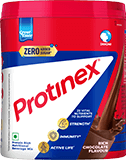
According to WHO, Quality of Life is “an individual’s perception of their position in life in the context of the culture and value systems in which they live and in relation to their goals, expectations, standards and concerns.”
Better quality of life helps to add life to years, not just years to life. The goal is to live a healthy, disease-free, happy life – longevity is just the byproduct. The Japanese concept of Ikigai, which is backed by scientific research, confirms that nutrition and physical activity play an important role in improving the quality of your life.
The parameters that affect QoL are physical health, psychological health, social relationships, and environmental factors. Out of these, the parameter which is most in our control is physical health, therefore consuming a balanced diet and staying active becomes imperative to help improve one’s quality of life.
In this post, let us delve deep into how nutrition, especially protein, and physical activity improve the quality of life. We will also look at how you can incorporate what you learn here into your life seamlessly. Scroll down!
Nutrition provides us with energy to sustain our bodily functions and perform day to day physical activities like walking, talking, typing, etc. We need around 1900-2200 calories per day. However, poor food choices create an energy imbalance. This happens when you consume more calories from foods that have lower nutritional value – for example, snacking on potato chips instead of an apple. Over a period of time, inadequate nutrition and high-calorie intake lead to obesity and obesity-related diseases/conditions. This inevitably affects your physical health and hence the quality of your life.
The right food choices that are rich in protein, dietary fiber, healthy fats, vitamins, and minerals have a great influence on your improving your health and thereby quality of life.
Let’s see how nutrition, especially a protein-rich diet, can help in improving your physical health and hence quality of life.
A balanced diet and regular physical exercise are crucial for maintaining a healthy weight and BMI and preventing excess weight gain. The way to follow a balanced meal is to include half a plate of vegetables or fruits, ¼ of the plate with protein, ¼ of the plate with whole grains, and healthy fats like plant oils in moderation. Vegetables, fruits, and whole grains provide your body with dietary fiber, vitamins, and minerals. Protein and fiber-rich foods can help improve satiety. As a result, you consume fewer calories and do not feel hungry all the time.
You also need to expend energy by exercising regularly. A sedentary lifestyle without physical activity causes weight gain and central obesity even when you consume food within the daily calorie intake limit. Being active will not only prevent weight gain but also keep obesity-related diseases at bay. As a result, your physical health becomes better and hence quality of your life is improved by several notches.
Consuming nutrient-dense foods and exercising regularly also keeps your lungs healthy. Protein-rich foods aid muscle growth and repair. They also strengthen your muscles and increase the energy reserves, boosting your stamina. Foods loaded with antioxidants like vegetables and fruits help flush out the toxins from the body and are highly desirable for improving your lung health.
Regular cardio exercise also equips the lungs to gradually function better during everyday tasks like walking and climbing stairs. The more stamina you build and improve your breathing, the more likely you are to live life to its fullest, irrespective of your age.
Several research studies have shown that working out regularly helps reduce depression and anxiety. Exercising helps release serotonin, a “feel-good” hormone that helps nullify the effect of the stress hormone, cortisol. As a result, the adverse effects of negative thoughts and stress at work or home starts to diminish.
Nutrition also plays a role here. Studies have shown that the lack of protein in your diet can affect your mood and how your brain works. The neurotransmitters in the brain are made of amino acids, the building blocks of protein. Protein helps stimulate the production of serotonin, dopamine, and norepinephrine, which improve your mood, mental energy, and alertness. Hence, it is important to get your daily requirement of protein and daily dose of exercise to stay stress-free.
Many studies have associated low protein intake with poor sleep quality. Tryptophan, an amino acid (building block of protein), has been found to induce sleep. Good sources of tryptophan are nuts and seeds, milk, cheese, and tuna.
Sleep deprivation or insomnia can be reversed through regular exercising. Alternate days of cardio and strength training helps expend the consumed calories and stored fat. This helps regulate your hormones and reduces hormonal disbalance. As a result, your sleep cycle goes back to normal, and a good night’s sleep can be achieved.
One of the elements of having a good quality of life means staying healthy and not having to depend on others for basic life activities. It can be achieved by taking care of your nutrition and exercising regularly. Focus on physical exercise and consume a balanced diet containing adequate amounts of vegetables, fruits, protein, whole grains, and moderate amounts of healthy fats. A nutritionally balanced diet plays a huge role in improving quality of life. Start with baby steps, set short-term goals, and document your journey. With time and consistent effort, you will start to see gradual improvement. Once that happens, you won’t want to go back to your old unhealthy habits. Go ahead, take charge, and live a good, long, healthy life!
Reference :
1. Mori, Kentaro. Sense of life worth living (ikigai) and incident functional disability in elderly Japanese: The Tsurugaya Project. Journal of psychosomatic research vol. 95 (2017): 62-67.
2. Jenkins, Catharine, and Carole Germaine. Living well in older age: what can we learn from the Japanese experience? Nursing older people vol. 31,1 (2019): 30-35.
3. Website: https://www.who.int/tools/whoqol Accessed on 23rd July, 2021.
4. Astrup, Arne, and Susanne Bügel. Overfed but undernourished: recognizing nutritional inadequacies/deficiencies in patients with overweight or obesity. International journal of obesity (2005) vol. 43,2 (2019): 219-232.
5. Champagne, Catherine M. Dietary intakes associated with successful weight loss and maintenance during the Weight Loss Maintenance trial. Journal of the American Dietetic Association vol. 111,12 (2011): 1826-35.
6. Kok, Car Reen, and Robert Hutkins. Yogurt and other fermented foods as sources of health-promoting bacteria. Nutrition reviews vol. 76,Suppl 1 (2018): 4-15.
7. Monda, Vincenzo. Exercise Modifies the Gut Microbiota with Positive Health Effects. Oxidative medicine and cellular longevity vol. 2017 (2017): 3831972.
8. Carek, Peter J. Exercise for the treatment of depression and anxiety. International journal of psychiatry in medicine vol. 41,1 (2011): 15-28.
9. Firth, Joseph. The Effects of Dietary Improvement on Symptoms of Depression and Anxiety: A Meta-Analysis of Randomized Controlled Trials. Psychosomatic medicine vol. 81,3 (2019): 265-280.
10. Dolezal, Brett A. Interrelationship between Sleep and Exercise: A Systematic Review. Advances in preventive medicine vol. 2017 (2017): 1364387.
